Key takeaways:
- Fair-trade sourcing ensures fair compensation for producers, promotes community development, and emphasizes environmental sustainability, creating meaningful connections between consumers and producers.
- Challenges in fair-trade sourcing include higher costs, lack of supply chain transparency, and the need for continuous education for both consumers and producers.
- Identifying fair-trade products involves looking for official certifications, researching brand practices, and engaging with local markets to enhance informed purchasing decisions.
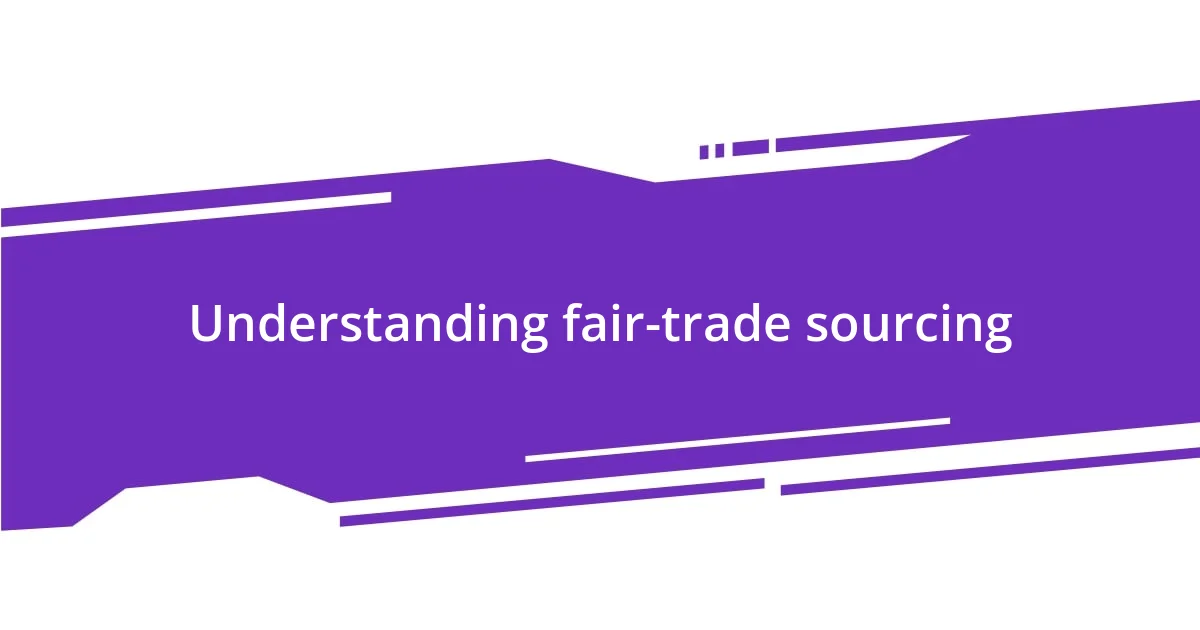
Understanding fair-trade sourcing
Fair trade sourcing is a method designed to ensure that producers, often in developing countries, receive fair payment for their goods. I remember the first time I purchased fair-trade coffee; it felt rewarding to know that my dollars were directly supporting farmers and their communities. Does that feeling resonate with you too, knowing your choices can uplift lives?
At its core, fair trade sourcing emphasizes transparency and ethical practices. I often find myself imagining the journey a product takes from a small farm to my kitchen table. How many hands contributed to that journey? When I learned that fair-trade products often come with strict guidelines that promote environmental sustainability and fair labor practices, it deepened my appreciation for the simple act of shopping.
Moreover, fair-trade sourcing creates a unique bond between consumers and producers. By choosing fair-trade options, I feel connected to the artisans and farmers behind the products. It’s like joining a global community where each purchase tells a story. Wouldn’t you agree that every coffee sip or chocolate bite becomes even sweeter when it supports a meaningful cause?
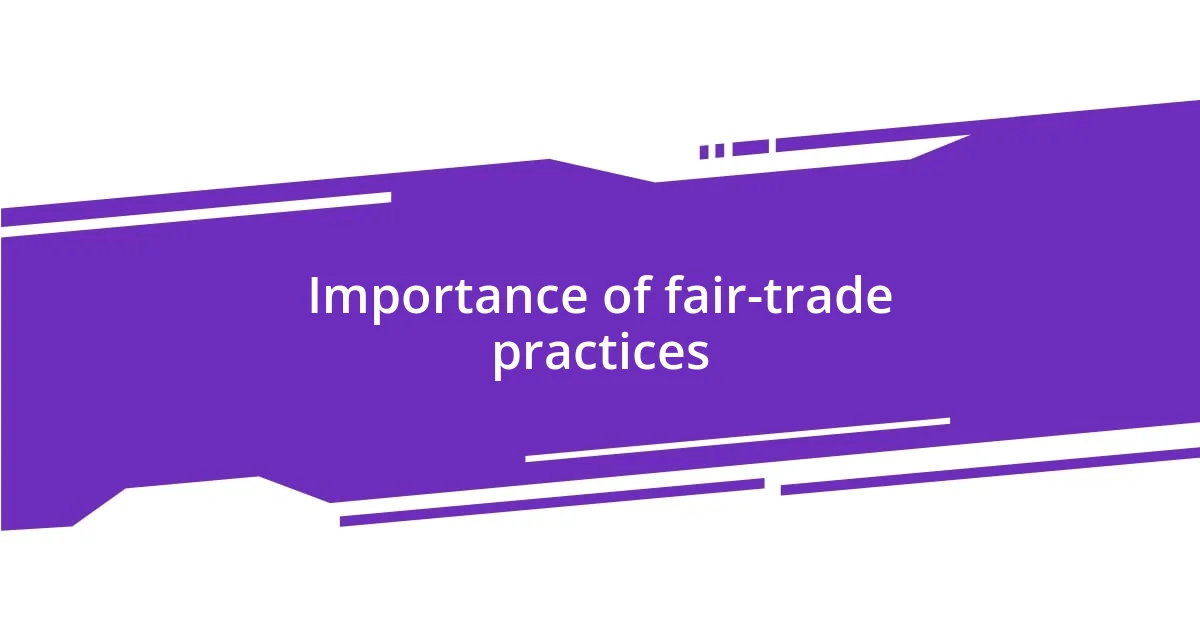
Importance of fair-trade practices
Fair-trade practices are crucial because they help establish a sustainable income for farmers and producers. The first time I learned about the significant difference in earnings for fair-trade versus conventional products, it struck me how a simple choice could have such a profound impact. I remember feeling empowered knowing my purchase helped families thrive instead of merely surviving.
Moreover, fair-trade practices contribute to community development. I once visited a fair-trade cooperative in a developing country, and I saw firsthand how the support from consumers directly funded schools and healthcare facilities. The smiles of children attending those schools reminded me that my buying decisions are more than transactions; they’re investments in a brighter future.
Lastly, supporting fair trade fosters consistent quality and innovation. I’ve noticed that fair-trade brands often prioritize craftsmanship and sustainability, resulting in products that are not just ethically sourced, but also exceptional in quality. When I savor a fair-trade chocolate bar, it tastes richer and more flavorful, knowing that skilled artisans have poured their heart into every step of the process.
| Fair-trade Practices | Conventional Practices |
|---|---|
| Ensures fair compensation for producers | Often associated with low wages |
| Supports community development initiatives | Less focus on community impact |
| Promotes sustainable agriculture | Frequently neglects environmental sustainability |
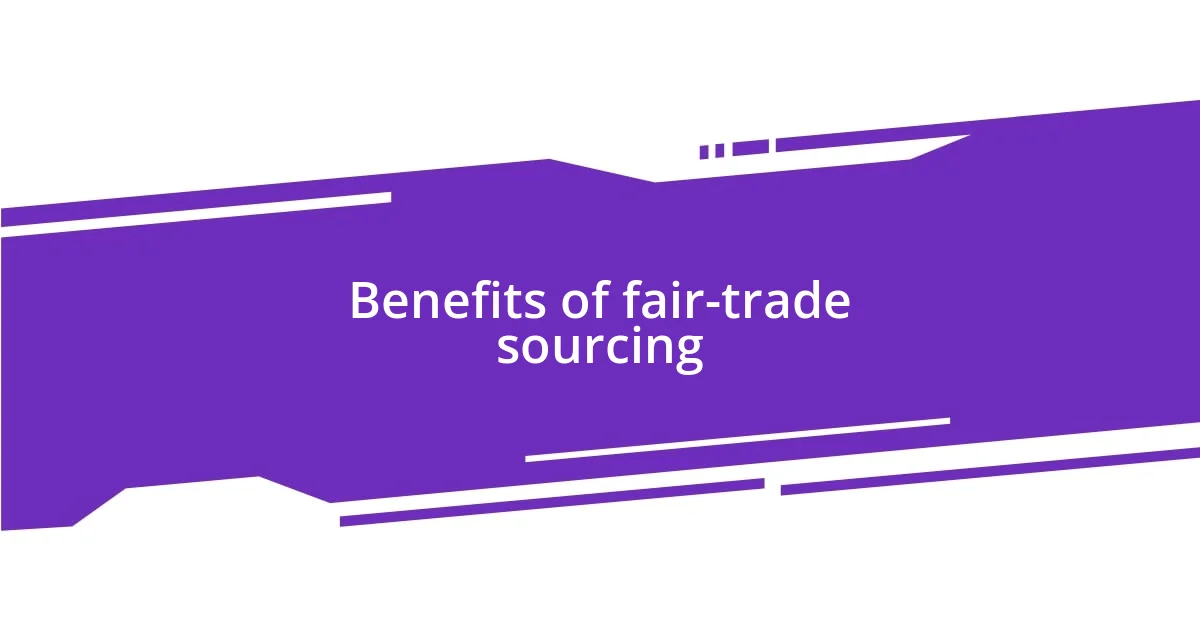
Benefits of fair-trade sourcing
Fair-trade sourcing comes with a range of benefits that ripple through economies and communities. Personally, I’ve seen how fair-trade principles can transform lives, as I once met a cocoa farmer who shared stories of how fair trade allowed his children to go to school. This small shift in opportunity can create a lasting impact, leading to better education and improved living conditions.
Here are some benefits of fair-trade sourcing:
– Empowerment of Producers: Fair-trade ensures that farmers receive fair compensation, empowering them to invest in their families and communities.
– Community Growth: Many fair-trade brands reinvest profits into local initiatives, helping build schools, clinics, and infrastructure.
– Environmental Sustainability: Fair-trade practices often promote organic farming methods, leading to healthier ecosystems.
– Quality Assurance: Products are generally of higher quality, as artisans and farmers take pride in their craft, knowing they are compensated fairly.
Each purchase is more than just a transaction; it’s a statement that we value ethical considerations in our daily choices. Like the time I picked up a fair-trade chocolate bar, I felt a sense of connection knowing that my sweet treat also supported environmental Stewardship and community upliftment. That dual satisfaction makes these products truly special.
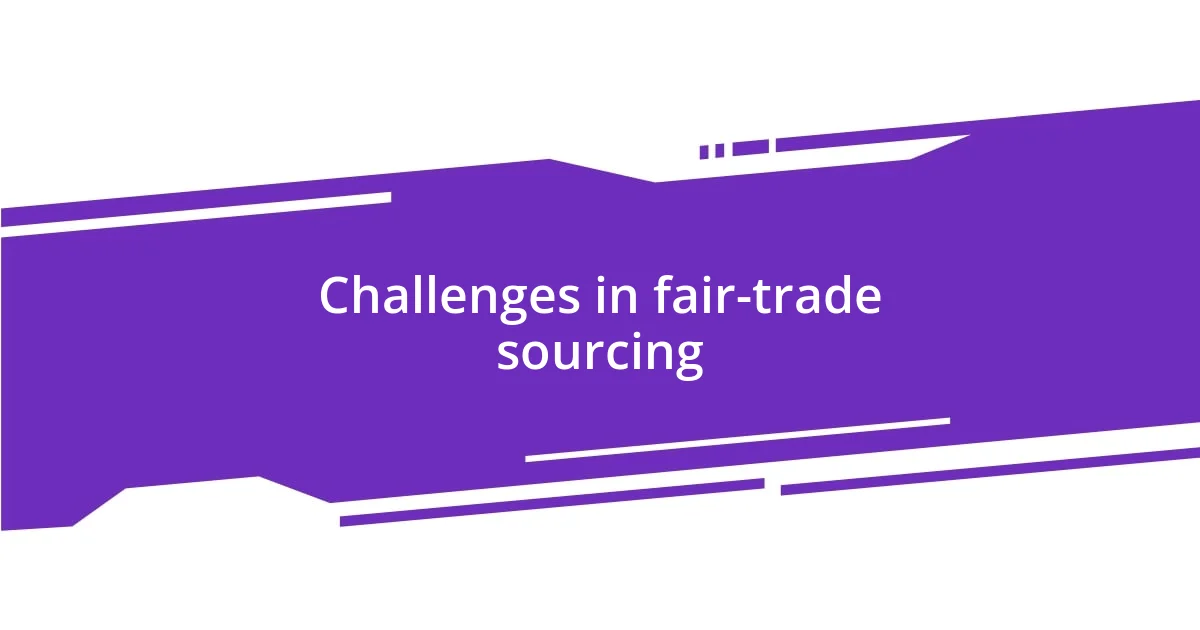
Challenges in fair-trade sourcing
Sourcing fair-trade products is not without its challenges. One significant hurdle I’ve encountered is the higher cost associated with fair-trade certification. When I first tried to source fair-trade coffee for my small café, I was surprised at the price difference compared to conventional options. It made me question if customers would appreciate the quality enough to pay a premium. It’s a delicate balance between ethical sourcing and maintaining affordability for consumers.
Then there’s the issue of supply chain transparency. I recall a project where we aimed to introduce fair-trade textiles, but tracing the entire supply chain became a logistical nightmare. It’s disheartening to think that despite intentions, there’s often a lack of visibility regarding where and how products are made, complicating our commitment to ethical ethics. How can we advocate for better practices if we can’t fully understand the path our products take before reaching us?
Moreover, the commitment to fair-trade principles demands continuous education for both consumers and producers. I’ve participated in workshops designed to inform local communities about the benefits and challenges of fair trade. The excitement was palpable, but it also raised the question: how do we sustain this momentum? There’s a need for ongoing dialogue and involvement to keep the conversation alive, ensuring everyone remains engaged in this crucial journey towards ethical sourcing.
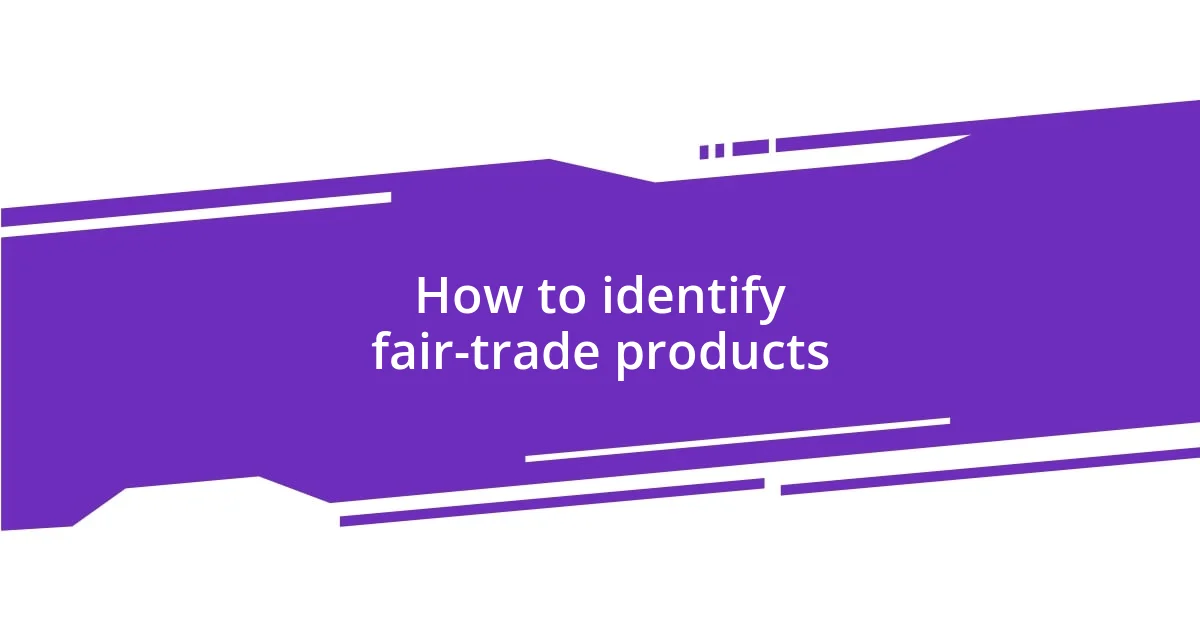
How to identify fair-trade products
To identify fair-trade products, the first step is to look for official certifications on packaging, such as the Fair Trade Certified logo. I remember the first time I spotted that seal on a bag of coffee; it felt like stumbling upon a hidden gem. That logo signifies a commitment to ethical sourcing practices and ensures that the farmers receive fair wages and work under safe conditions.
Another handy tip is to research brands that prioritize transparency. I often visit brand websites to see their sourcing practices outlined clearly. It’s rewarding to support companies that share their stories and show how they give back to their communities. Have you ever felt a deeper connection to a product because you knew its origin? That sense of trust is invaluable.
Lastly, engaging with local markets can also reveal fair-trade options. I’ve had intriguing conversations with vendors about their sourcing practices, which often opens up a wealth of information about the producers behind the goods. These personal interactions not only educate me further but also foster a community of conscious consumers. Making informed choices enhances the joy of shopping, doesn’t it? It’s all about understanding the impact of our purchases.
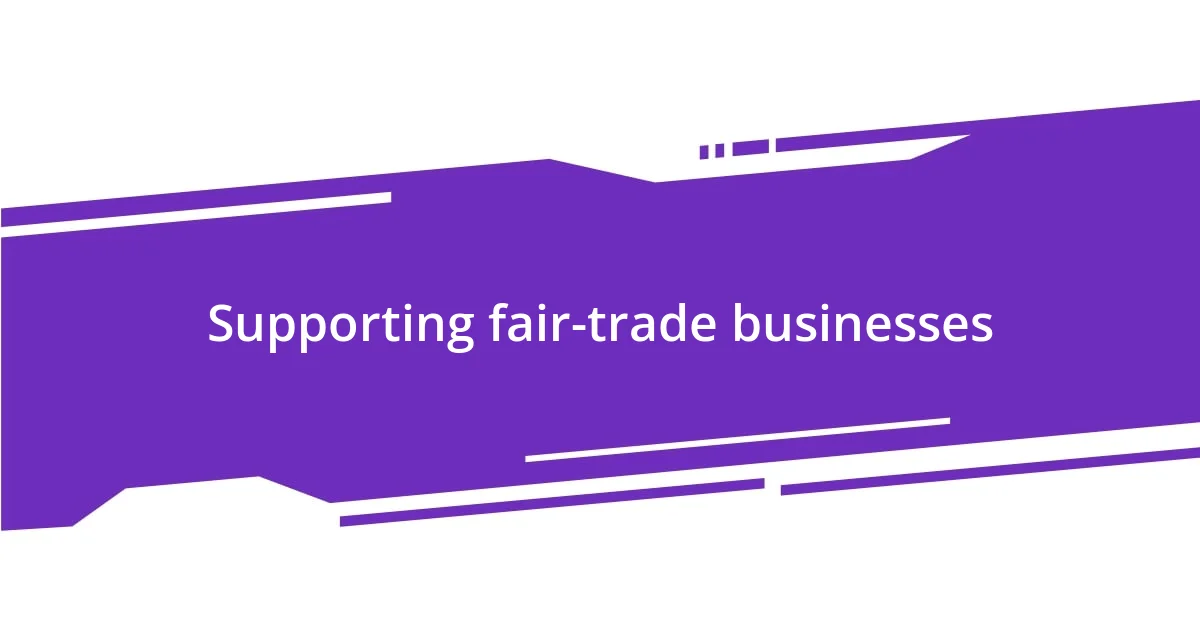
Supporting fair-trade businesses
Supporting fair-trade businesses goes beyond simply purchasing products; it’s about creating a community that values ethical practices. I remember attending a fair-trade festival where vendors shared their journeys. Hearing their stories made me appreciate the hard work behind each product, and it ignited a passion within me to support these businesses even more. Have you ever felt that spark when connecting with a brand’s mission?
Engaging with fair-trade brands also means advocating for their practices. I often find myself discussing fair trade with friends and family, explaining how each purchase supports a sustainable future. It’s uplifting to see how sharing knowledge encourages others to think twice about their choices. Why not spark a conversation the next time you chat about shopping? You might inspire someone to join the movement.
Another way I’ve found to support fair-trade businesses is by using social media to amplify their voices. Sharing posts that highlight their stories or unique products can reach a broader audience. Recently, I started following a local fair-trade co-op on Instagram, and I love watching their updates. It’s a wonderful reminder that we can create change together, one post at a time. How impactful do you think your voice can be in this journey?
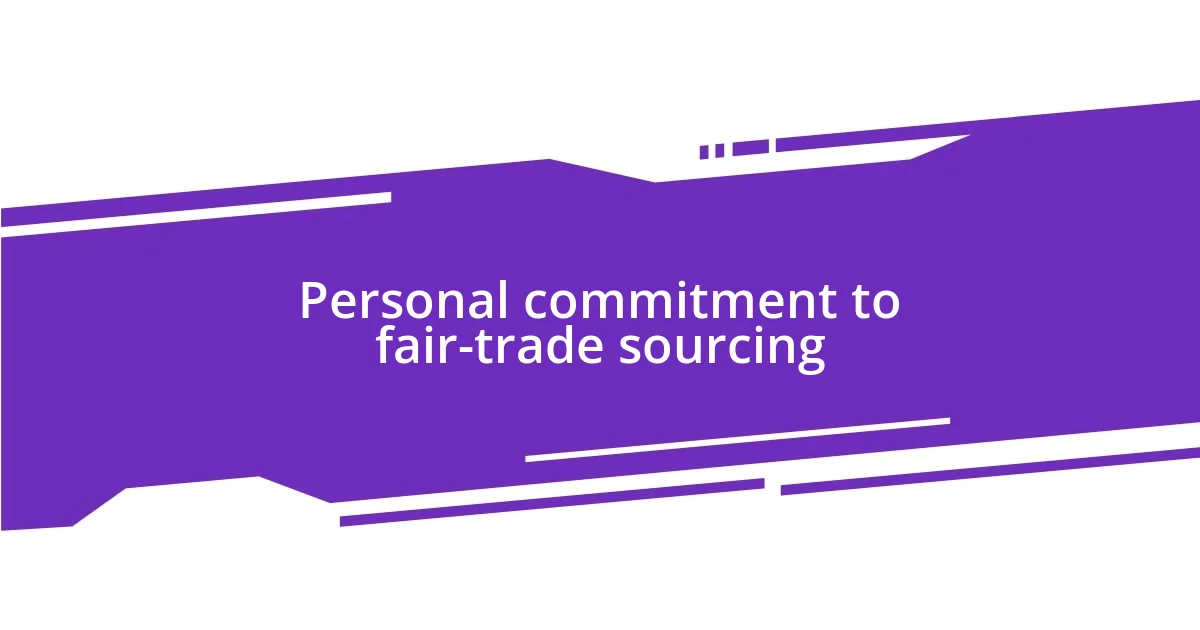
Personal commitment to fair-trade sourcing
My personal commitment to fair-trade sourcing runs deep. I started making conscious choices after learning about the stories behind various products. One day, while sipping fair-trade tea, I couldn’t help but think about the farmers who nurtured the leaves. It’s amazing how something as simple as a warm cup can connect us to the meaningful lives of others.
I actively seek out opportunities to educate myself further about fair trade. Recently, I participated in a workshop focused on ethical consumerism, and it was an eye-opener. Listening to experts discuss the differences between fair trade and conventional sourcing made me realize how vital our choices are. Have you ever felt empowered by gaining knowledge that affects your daily life?
On top of making informed purchases, I strive to inspire others around me. During a casual dinner, I shared my favorite fair-trade products with friends, and it sparked a lively discussion about sustainable practices. It felt gratifying to see them intrigued and wanting to learn more. Isn’t it fulfilling to think that our conversations can create a ripple effect?














